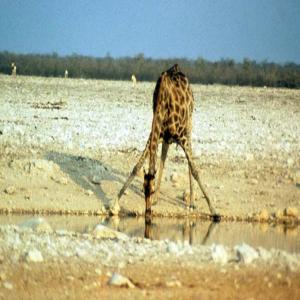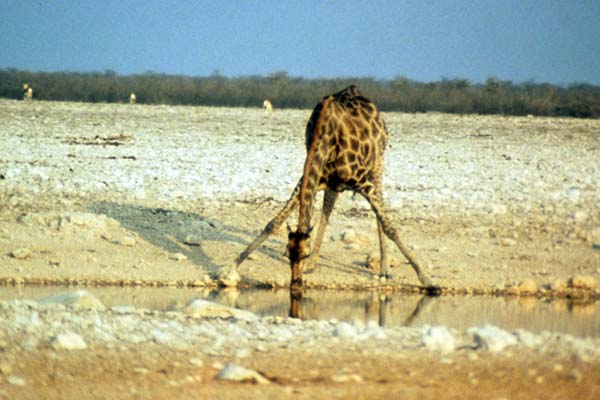Episodes

Monday Sep 15, 2014
The WildLife: Madison Vorva, Girl Scout and Teen Activist for Orangutans
Monday Sep 15, 2014
Monday Sep 15, 2014
In 2007 fellow Girl Scouts Madison Vorva and her friend Rhiannon Tomtishen embarked on a campaign to save the orangutan by targeting unsustainable palm oil production and the many products that use it, including Girl Scout cookies. Both young women have been featured on major media outlets and have won several awards for their activism, including the United Nations Forest Heroes award.

Monday Aug 25, 2014
Monday Aug 25, 2014
Since she was in 6th grade, Rhiannon Tomtishen has been passionate about orangutans. As a Girl Scout, that passion led her to fight for deforestation-free palm oil together with her friend Madison Vorva. The story of these two girls inspires young and old alike and shows how simple actions can make a big difference. Now 19 years old, this eloquent young women shares her experience and advises us all to follow our passion.

Monday Sep 13, 2010
The WildLife: Lorises, Anna Nekaris
Monday Sep 13, 2010
Monday Sep 13, 2010
Anna Nekaris, an expert on nocturnal primates, discusses Asia’s slow and slender lorises. She reveals to “The WildLife” host Laurel Neme what makes these creatures so special and why they’re sought after both as pets and as a key ingredient in traditional medicine. Did you know that the lovable, furry Ewoks in Star Wars films were modeled after slow lorises? But unlike Ewoks, lorises can’t jump or leap, which means they can only move through the forest canopy by using branches that touch.That makes an intact forest vital to their survival. Lorises are also one of the only venomous primates. They have a form of biological venom that’s produced by a gland in their elbows, which they mix with saliva to create a powerful toxin. These unique characteristics are what make them a sought after ingredient in traditional medicine across Asia. In fact, Anna and her research team recently completed the first major study of the use of lorises in traditional medicine in Asia and found a multitude of uses -- as a tonic for women after childbirth, for stomach problems, for healing wounds and broken bones, and in the treatment of sexually transmitted diseases. Lorises are seen as “an animal with 100 uses,” akin to aspirin in Western medicine. Anna Nekaris is a Reader and Course Tutor in Primate Conservation at Oxford Brookes University in the United Kingdom. She is also a member of the IUCN/SSC Primates Specialist Group, the Conservation Working Party of the Primate Society of Great Britain, and on the editorial board of Endangered Species Research and Folia Primatologica. Anna’s main research interests fall under the areas conservation, ecology, and speciation, with her fieldwork taking her to Trinidad, Senegal, Utah, India, Sri Lanka, Singapore, Indonesia, Uganda and Kenya. Although she has conducted fieldwork on bats, small carnivores (including civets and cats), mouse deer, and giant squirrels, her primary research focus is on primates. She has conducted many long-term studies of Indian and Sri Lankan slender lorises. Her current research project, on the diversity and conservation of Asian slow lorises, is being undertaken by Anna and postgraduate students in Java, Sumatra, Thailand, Cambodia, Laos, Singapore and Malaysia, where at least five species of slow loris are found. The team is using morphological, behavioral and vocal analyses to uncover diversity within this group. She has written several articles on the loris trade, including in Endangered Species Research and the American Journal of Primatology, contributed an article on the Javan slow loris to the IUCN/SSC Primate Specialist Groups Top 25 Most Endangered Primates, written a book that includes myths and legends on slender lorises, and contributes to the Loris Potto Conservation Database. This episode of “The WildLife” aired on The Radiator, WOMM-LP, 105.9 FM in Burlington, Vermont on September 13, 2010.

Monday Apr 12, 2010
Monday Apr 12, 2010
Michelle Desilets, Executive Director of the Orangutan Land Trust, discusses the rehabilitation of rescued orangutans and new approaches to help save this species in the second of a two-part interview. She tells “The WildLife” host Laurel Neme how a rescued orangutan learns to be wild with mesmerizing stories of the "school" at Nyaru Menteng Orangutan Reintroduction Project in Kalimantan, Indonesia. She also explores innovative ways to help protect orangutans and their habitat. Michelle Desilets has been working on orangutan conservation alongside Lone Droscher Nielsen, the internationally well-known champion of these apes, for over 15 years. Together, the two women founded the Nyaru Menteng Orangutan Reintroduction Project which now has over 600 orangutans in its care, making it the largest such center in the world. Michelle also founded the Borneo Orangutan Survival Foundation UK (BOS) and served as its Executive Director and initiated a number of international campaigns to help orangutans, such as campaigns to end the illegal trade of orangutans and to repatriate known smuggled orangutans, as well as the campaign for sustainable palm oil. Currently, she is the Executive Director of the Orangutan Land Trust. She also sits on several working groups in the Roundtable for Sustainable Palm Oil and spends a good deal of time at the Nyaru Menteng project.This episode of “The WildLife” aired on The Radiator, WOMM-LP, 105.9 FM in Burlington, Vermont on April 12, 2010.

Monday Apr 05, 2010
The WildLife: Orangutans Part I, Michelle Desilets & Shawn Thompson
Monday Apr 05, 2010
Monday Apr 05, 2010
Michelle Desilets, Executive Director of the Orangutan Land Trust, divulges the interesting biology and habits of orangutans in the first of a two-part interview. She gives “The WildLife” host Laurel Neme an insider’s look at what makes these red apes fascinating, endearing, infuriating and worthy of protection. For instance, did you know orangutans don’t like the rain? Yet they don’t complain and instead fashion roofs and umbrellas out of leaves. You’ll also gain insights into why these animals are under threat. Michelle Desilets has been working on orangutan conservation alongside Lone Droscher Nielsen, the internationally well-known champion of these apes, for over 15 years. Together, the two women founded the Nyaru Menteng Orangutan Reintroduction Project which now has over 600 orangutans in its care, making it the largest such center in the world. Michelle also founded the Borneo Orangutan Survival Foundation UK (BOS) and served as its Executive Director and initiated a number of international campaigns to help orangutans, such as campaigns to end the illegal trade of orangutans and to repatriate known smuggled orangutans, as well as the campaign for sustainable palm oil. Currently, she is the Executive Director of the Orangutan Land Trust. She also sits on several working groups in the Roundtable for Sustainable Palm Oil and spends a good deal of time at the Nyaru Menteng project. In this podcast, you’ll also hear Shawn Thompson, author of a new book on orangutans called The Intimate Ape. Shawn is a university professor at Thompson Rivers University in British Columbia, Canada as well as a writer. As a journalist, he rode a Canadian submarine, tracked down a fugitive in the Dominican Republic and was voluntarily incarcerated for a weekend in Canada's oldest maximum-security federal penitentiary. In 2001, he went to the jungles of Borneo to see orangutans and discovered a new passion in his life. His latest book, called The Intimate Ape, is about orangutans and came out in March 2010. To write it, he spent years hiking through the jungles of Borneo and Sumatra and had many adventures -- from getting chased by wild pygmy elephants in Borneo, to sleeping inside the zoo in Jakarta. This episode of “The WildLife” aired on The Radiator, WOMM-LP, 105.9 FM in Burlington, Vermont on April 5, 2010.

